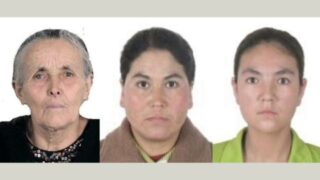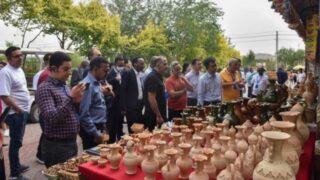The CCP brings seven million tourists to the “Wild West” of China, where locals are compelled to dance, sing, and pretend to be happy for the benefit of Han Chinese visitors.
by Ruth Ingram


Table of Contents
False “Ethnic Experiences”
To much fanfare, the first 9D glass-bottomed bridge in northwest China’s Xinjiang Uygur Autonomous Region spanning the 280 meters of the now concrete-encased Kaidu River, has just opened in Longshan Park. Not only can visitors enjoy the views from a giddying 50 meters up, but they can feel an added frisson of excitement as the glass beneath their plastic bag-wrapped feet appears to shatter and crack loudly. Clinging for dear life to the railings in fear or squealing with delight, the largely Han Chinese tourist dare-devils survive the ordeal and move onto the next Xinjiang experience especially watered down for their benefit.


Now that it is ‘safe’ to visit the “Wild West” with the “troublemakers” securely locked away in the transformation through education camps, the Xinjiang tourist board has been working overtime to offer a sunnier narrative of the Uyghur heartland. Happy faced “locals” peer through the pages of the brochures, cooking exotic food, singing and dancing wearing rainbow-colored national dress and playing ancient musical instruments to order. No mention is made of course of the sinister parallel universe backdrop to these smiles where three million or more of their compatriots are locked away behind layers of razor wire; and the rest are living in terror, but not daring to breathe a word.


Myriad “ethnic experiences” offered by tour groups in inner China are drawing hordes of visitors. Dizzying Culture and Tourism Department statistics claim more than 7.2 million visits to the region during the recent Mid-Autumn Festival in September, an increase of 37.23 percent from last year, and boosting State coffers to the tune of 11.7 billion yuan ($1.65 billion). The province is proving to be a veritable goldmine with ambitious goals of 300 million tourist visits by 2020 and earnings of US$87 billion forecast, according to the region’s tourism bureau. Given that foreign tourist visas for Xinjiang now require stringent conditions and multitudinous form filling, the pockets of an emerging Chinese middle class with funds to spare are there for the emptying. And they are coming in droves.
“Sinicized” Naan Bread for Tourists
Visitors from all over the country took the opportunity to celebrate a Xinjiang-style festival this year seizing the chance to make Xinjiang-style mooncakes and try their hand at making Uyghur “crispy pancake” “Nang” in an especially sanitized cultural industrial park built for the occasion in the capital Urumqi.
A massive mooncake-shaped Uyghur “Nang” (Mandarin transliteration of naan bread) to celebrate Communist China’s 70th birthday on October 1st, was baked for the occasion, proudly emblazoned with the words, “Celebrate the birthday of my country.” Beijing is doing its best to plant Mid-Autumn firmly into the calendar of the Uyghur homeland.


But all this is an anathema to Uyghurs themselves, who neither celebrate the Han festival, nor decorate their “sacred” naan bread in any way. “They are making us celebrate all the Chinese festivals these days,” said Umit, a Uyghur youth who is enjoying brief spells of freedom these days after two years in full time “re-education.” He has been given weekend home release from his compulsory government-imposed factory job, but is on a tight leash. “Any wrong move and I am returned full time,” he told a Han Chinese neighbor who passed on the news of his reprieve. “The government want us to keep our identity in name only, but to behave as the Han. We must now love everything Chinese.” He feels nothing but sadness when he sees his beloved naan bread scrawled with Chinese slogans. “Not even our bread is sacred these days,” he said.
Uyghurs Compelled to Sing and Dance
Streets in Kashgar’s old city have been peppered this summer with dancers in rainbow colors and Uyghur national instrument players entertaining streams of camera toting tour groups. The selfie-stick-wielding visitors wander in shorts and skimpy tops (an affront to the modest clothing preferred by the Muslim inhabitants) through the ancient lanes, taking close-ups of themselves arm in arm with exotic “local folk” shouting “Yak-a-sheeee” with abandon as they wander (the one phrase they have learned for their visit, the equivalent to the Mandarin “Ni hao” (hello) in Uygur).


For the past few years, Uyghur “Korban” sacrifice festival celebrations have been muted. The usual house to house visiting and large gatherings to commemorate the Abrahamic story of sacrifice have been forbidden and families have been observing the rituals quietly and often secretly at home. This year, however, tourists were treated to celebrations on a scale not seen for many years.


Exiled Uygur diaspora could not believe their eyes when videos began circulating of nationals dancing in front of Kashgar’s main Id Kah mosque watched by crowds of tourists. Many assumed the pictures were fabricated, but after assurances they were genuine, they accused the government of cynical abuse of their culture. “We have become monkeys in a zoo,” said Dilshat, who escaped to Holland several years ago when he saw the writing on the wall for his people. “No one even goes to the mosque these days for fear of imprisonment. Now even our sacred festivals are put on as amusement for Chinese tourists,” he said with disgust. “If there is any chance they can make money, Beijing will allow it,” he said, condemning the commercialization of his culture.
“Your Daughters Should Dance for Chinese ‘Relatives’”
“Make your daughters dance for us!” demand the Chinese bureaucrats imposed on Nazira’s family. The Government assigned Han “relatives” to Nazira’s family, who visit when her husband is away on business, sit and smoke around her table, which she has to fill with Chinese delicacies, and drink beer. Whenever they visit, she is terrified as to how the evening will progress. She has deliberately put on weight since they started their visits, which are ostensibly to teach her government policy, the Chinese language and to supervise her compliance with the law. So far, they have only targeted her daughters and demanded that they dance for them after dinner.
She quickly dresses them in their best bright outfits, tells them to dance, and sends them quickly off to bed.
She retires early, locks herself in with her girls, and listens to the “relatives”’ loud laughing and joking into the early hours. “At least the dancing seems to satisfy them for the moment,” she says.
She prays they are gone by the morning.









